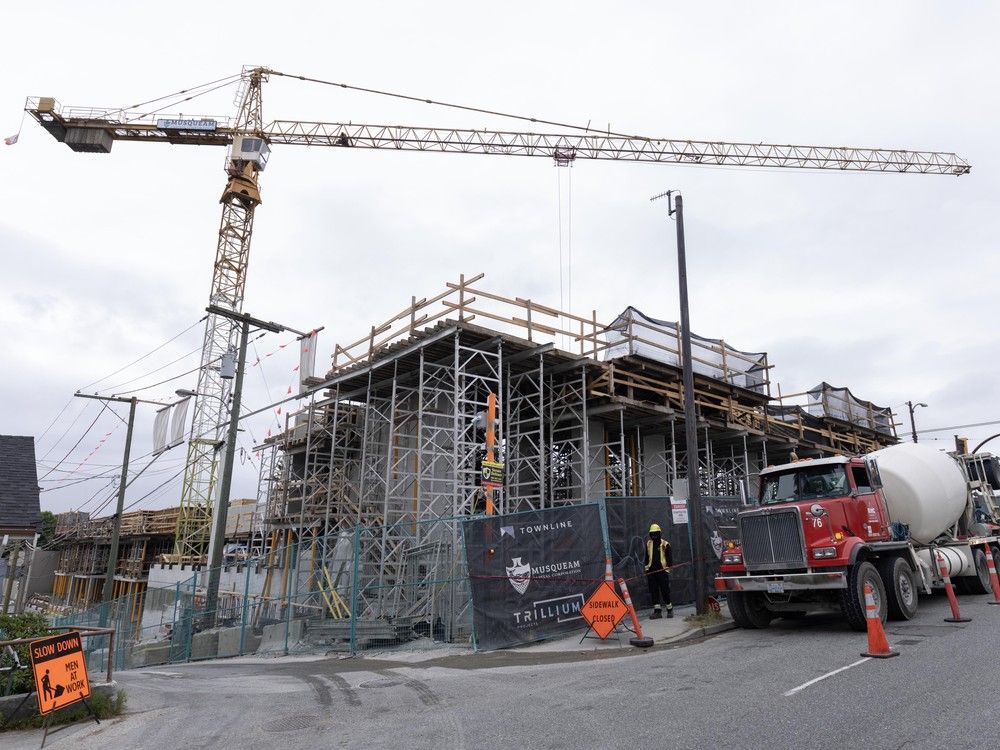
The B.C. government is lending a hand to the ailing homebuilding industry in the province’s most populous region, effectively slashing development charges for many projects already in the pipeline.
The province confirmed to Postmedia News that for residential projects in Metro Vancouver initiated before March 2024, fees to pay for growth-related infrastructure, such as water, wastewater and parks, will be reduced.
Developers of these “in-stream” projects will be able to pay development cost charges under the old fee structure, instead of the new one that more than tripled this year.
Metro’s funding shortfall from the reduced development charges will be backstopped by $250 million from the federal government.
The move is being welcomed by some of B.C.’s biggest development companies. The industry had lobbied for some kind of relief since the higher fees were unveiled in 2023, warning the increases would kill previously viable projects.
Rick Ilich, CEO of Townline, a major Vancouver-area developer of strata and rental housing, called the in-stream protections a “bold move” that will protect thousands of jobs in Metro and provides a measure of certainty in an uncertain time.
The change is unlikely to make a major difference for many Vancouver-area condo projects considering the state of the overall market, Ilich said, but it could help some rental projects get “unstuck.”
Townline has three projects in Vancouver, totalling 670 rental and 380 strata units, that will benefit from the change and will move forward, Ilich said.
While the province, the federal government and many municipal governments are aligned on the goal of dramatically boosting housing supply, several factors — including increasing costs of all kinds, a tight labour market, a U.S. trade war and related uncertainty — are converging to create a challenging market environment for residential projects to proceed. Some of B.C.’s largest development and real estate companies, including Wesgroup and Rennie , have recently laid of significant portions of their staff.
Metro’s new fee structure was set in 2023, representing increases as high as 255 per cent over three years. It was implemented over the objections of developers and, in a rare case, Canada’s then-housing minister , who cautioned the increases were so dramatic that they would render several planned developments unviable.
The fee hikes were approved by a vote of Metro’s board of directors, a body made up of mayors and councillors from throughout the region, who argued that, despite the industry’s protests, development fee hikes were needed to fund necessary infrastructure upgrades.
That federal funding commitment was announced late last year, and since then, representatives of the B.C. and Canadian governments have been negotiating the terms of the deal, said B.C. Housing Minister Ravi Kahlon on Monday. The two parties reached an agreement on March 22 of this year — which wasn’t publicly known until now, Kahlon said — that applies the old, lower DCCs to projects whose applications were submitted prior to March 22, 2024, and whose permits are issued before March 22, 2026.
“It’s using federal dollars to lower the cost of construction so we can continue to see housing supplied,” Kahlon said.
“We spent many months trying to negotiate this, and certainly, it’s an example of what can happen when you have partnerships between the federal government, the development industry, as well as the province.”
Under Metro’s new fee structure, which took effect Jan. 1, development charges for each purpose-built rental apartment more than tripled from $6,249 per unit to $20,906.
Kahlon has heard some people describe these kinds of moves as government handouts to the development industry, but he disputes that characterization.
“Having sat down with both not-for-profit builders and private builders, and gone through their pro-formas, I can say that this will be the difference between housing happening, and it not happening. It’s not the difference between somebody making a little bit of money and a lot of money,” Kahlon said. “There’s a big difference between the two.”
Metro estimated that allowing developers to pay the old, lower charges would mean the regional government needed to recoup about $220 million to make up for the shortfall, said Heather McNeil, Metro’s deputy CAO.
“But there’s no revenue coming in if projects don’t move forward,” she said.
Municipalities collect development cost charges and submit them to Metro twice a year. Metro couldn’t immediately provide the number of projects and total homes affected by this change.
In a written statement, Metro board chairman Mike Hurley, the mayor of Burnaby, said: “Allowing more time to continue paying 2024 rates offers developers more financial certainty for eligible developments, which can help to advance housing, support local jobs and stimulate the economy.”
Urban Development Institute president Anne McMullin said the in-stream protection period is “a meaningful step that reflects the realities of today’s development environment.”
“Current high-cost conditions have placed significant pressure on project viability, and without this change, many projects would not have been able to proceed,” McMullin said. “This change demonstrates a practical understanding of the barriers facing the industry and helps ease some of the immediate pressure on projects, so they can move forward.”